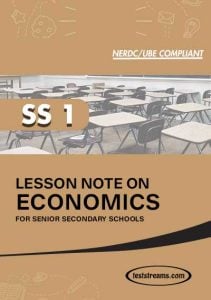This ECONOMICS Lesson Note was pulled from our book (Lesson Note on ECONOMICS for SS1 MS-WORD); Compiled to serve as reference material to help teachers draw out their lesson plan easier, saving you valuable time to focus on the core job of teaching.
This ECONOMICS Lesson Note Covers The Following Topics
- MEANING OF ECONOMICS
- ECONOMICS AS A SCIENCE, ARTS OR SOCIAL SUBJECT?
- BASIC CONCEPTS IN ECONOMICS
- IMPORTANCE TO OPPORTUNITY COST
- ECONOMIC PROBLEMS OF THE SOCIETY
- BASIC TOOLS OF ECONOMIC ANALYSIS
- ECONOMIC PROBLEMS OF THE SOCIETY
- THEORY OF PRODUCTION
- LABOUR MARKET
- DIVISION OF LABOUR
- SCALE OF PRODUCTION (SMALL, MEDIUM AND LARGE)
- FIRM
- BUSINESS ORGANIZATION
- JOINT STOCK COMPANIES
- PUBLIC ENTERPRISES
- POPULATION
- THEORIES OF POPULATION
- LABOUR MARKET
- DISTRIBUTIVE TRADE
- MIDDLEMEN
- MONEY
- FINANCIAL INSTITUTIONS
- THE CONCEPT OF DEMAND
- SUPPLY
- EQUILIBRIUM PRICE/PRICE DETERMINATION
- THE NATURE OF THE NIGERIAN ECONOMY
- AGRICULTURE
- MINING
Sample note
Week 1
Topic – Meaning of Economics
Content –
- Definition of Economics
- Nature and Scope of Economics
- Concept of Economics
- Importance of the study of Economics
Meaning of Economics
The subject Economics has been defined in many ways by so many expert in the subject. According to Adam Smith; Economics is about the making of wealth. He is regarded as father of Economics.
Alfred Marshal defined Economics as the study of mankind in the ordinary business of life.
John Stuart defined Economics as the practical science of production and distribution of wealth.
A.C. Pigou defined Economics as science of material welfare; he sees economics as a way of acquiring wealth to improve the welfare of human being.
The most generally acceptable definition is the one given by Lord Lionel Robbins; he defined Economics as the science which studies human behavior as a relationship between ends and scarce means which have alternative uses. This definition comprises all the major aspects of Economics
Nature and Scope of Economics
Economics belongs to group of subject called social science; other social science subject includes geography, political science, sociology, government, philosophy etc. Economics is a social science subject because it has to do with the study of human behavior. It is concerned with the change of human towards increase and decrease in prices of goods and services, how people achieve their wants, how they interact in the process of buying and selling etc.
Economics is also regarded as a science subject but does not assume the same level of precision and accuracy like other science subject because Economic deals with human behavior and human behavior changes. It adopts scientific method which involves
- Observation
- Formulating hypothesis
- Collection of data
- Organizing or analyzing the data
- Formulating laws
- Testing the laws
- Prediction on the basis of the laws
Basic concepts of Economics
The basic concepts of Economics are
- WANTS: Want may be defined as an insatiable desire or need by human beings to own goods or services that give satisfaction. The basic needs of man include; food, housing and clothing. Human needs are many. They include tangible goods like houses, cars, chairs, television set, radio, e.t.c. while the others are in form of services, e.g. tailoring, carpentry, medical; e.t.c. Human wants and needs are many and are usually described as insatiable because the means of satisfying them are limited or scarce
- SCARCITY: Scarcity is defined as the limited supply of resources which are used for the satisfaction of unlimited wants. In other words, scarcity is the inability of human beings to provide themselves with all the things they desire or want. These resources are scarce relative to their demand. As a student you will need #150 to buy school materials but you have only #100. It can be seen that the money you have, which is your resources, will not be sufficient to buy all you need. The available resources within the environment can never at any time be in abundance to satisfy all human wants. Since wants are numerous and insatiable relative to the available resources, human beings have to choose the most important ones and leave the less important ones. There would be no economic problem if resources were not scarce.
- CHOICE: It can be defined as a system of selecting or choosing one out of a number of alternatives.Human wants are many and we cannot satisfy all of them because of our limited resources. We therefore decide which of the wants we can satisfy first. Choice arises as a result of the resources used in satisfying these wants. Choice therefore arises as a result of scarcity of resources. Since it is extremely difficult to produce everything one wants, choice has to be made by accepting or taking up the most pressing wants for satisfaction based on the available resources.
- OPPORTUNITY COST: It is defined as an expression of cost in terms of forgone alternatives. It is the satisfaction of one’s want at the expense of another want. It refers to the wants that are left unsatisfied in order to satisfy another more pressing need. Human wants are many, while the means of satisfying them are scarce or limited. We are therefore faced with the problem where we have to choose one from a whole set of human wants, to choose one means to forgo the other. A farmer who has only #300 and wants to buy a cutlass and a hoe may discover that he cannot get both materials for #300. He would therefore choose which one he has to buy with the money he has. If he decides to buy a cutlass, it means he has decided to forgo the hoe. The hoe is thus what he has sacrificed in order to own a cutlass. The hoe he has sacrificed is the forgone alternative and this is what is referred to as opportunity cost.
- SCALE OF PREFERENCE: This is the list of unsatisfied wants arranged in an order of their relative importance, it is a list showing the order in which we want to satisfy our wants in order of priority
Why We Study Economics
We study Economics because of the following reasons
- Rational decision: the study of economics enables individual, group or government to make a rational or wise choice among their numerous needs with their scarce resources.
- Production: the study of economics helps the producer to determine what to produce, where to produce, for whom to produce and to know the factor f production.
- Provision of basic tools: Economics helps to provide basic tools that will help to solve and analyze economic problems in any firm or organization.
- Allocation of resources: The knowledge of economics helps the government to allocate her scarce resources to different sector of the economy.
- Preparation of budget: Economics helps the government to determine her expected income and expenditure of the country.
- Participation in government: The knowledge of economics helps individual to participate in government affairs.
- Satisfaction of wants: It helps us to utilize the principle of choice and other concept of economics in satisfying our wants.
- Consumption of commodities: It assists us to determine the pattern of consumption in our environment.
- It helps government to develop programmes that are beneficial to the people
It helps business men and women to maximize their profits

Get the complete Lesson Note with more content at very affordable price. Lesson Note on ECONOMICS for SS1 MS-WORD- PDF
![]()



